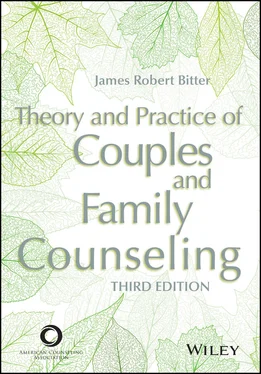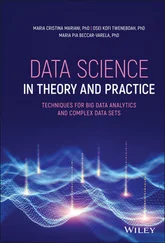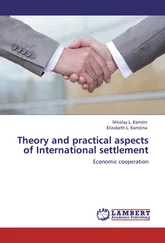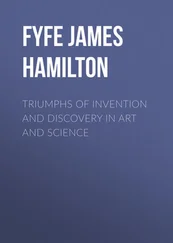James Robert Bitter - Theory and Practice of Couples and Family Counseling
Здесь есть возможность читать онлайн «James Robert Bitter - Theory and Practice of Couples and Family Counseling» — ознакомительный отрывок электронной книги совершенно бесплатно, а после прочтения отрывка купить полную версию. В некоторых случаях можно слушать аудио, скачать через торрент в формате fb2 и присутствует краткое содержание. Жанр: unrecognised, на английском языке. Описание произведения, (предисловие) а так же отзывы посетителей доступны на портале библиотеки ЛибКат.
- Название:Theory and Practice of Couples and Family Counseling
- Автор:
- Жанр:
- Год:неизвестен
- ISBN:нет данных
- Рейтинг книги:5 / 5. Голосов: 1
-
Избранное:Добавить в избранное
- Отзывы:
-
Ваша оценка:
- 100
- 1
- 2
- 3
- 4
- 5
Theory and Practice of Couples and Family Counseling: краткое содержание, описание и аннотация
Предлагаем к чтению аннотацию, описание, краткое содержание или предисловие (зависит от того, что написал сам автор книги «Theory and Practice of Couples and Family Counseling»). Если вы не нашли необходимую информацию о книге — напишите в комментариях, мы постараемся отыскать её.
Theory and Practice of Couples and Family Counseling — читать онлайн ознакомительный отрывок
Ниже представлен текст книги, разбитый по страницам. Система сохранения места последней прочитанной страницы, позволяет с удобством читать онлайн бесплатно книгу «Theory and Practice of Couples and Family Counseling», без необходимости каждый раз заново искать на чём Вы остановились. Поставьте закладку, и сможете в любой момент перейти на страницу, на которой закончили чтение.
Интервал:
Закладка:
Over time, various ideas and models will start to appeal to you: They will fit with your values and beliefs and, in some cases, they will even enhance or broaden your worldview. You will start to create a foundation for your work, and you will find that parts of different models will integrate into that foundation. This is not a process that happens quickly. It will certainly not happen at the end of a course or two on the theories and practices of marriage and family counseling. This is a lifelong journey.
You might start by asking yourself the following questions:
What beliefs do these theorists and practitioners have about families in general?
Do I hold these same beliefs, ideas, or values, or do other values and positions seem more important to me?
If I were bringing my family of origin and/or my current family members to counseling with me, would I want to go to a family practitioner, counselor, or therapist using this approach? Why or why not? What would my expectations be? What goals would I have for the work I was contemplating in counseling?
What kind of relationship would I want to have with the family practitioner? What would contribute to my trust, comfort, willingness to work, determination to change, and feeling of accomplishment at the end?
There are useful parts to every theory and model we will consider in this book. None of the approaches considered here holds a claim to absolute truth, however, or even to the right way to do family practice. Each theory is built on a perspective and provides a different kind of lens through which families may be viewed and understood. And each of these perspectives inevitably has continually developing implications for family practice.
Finding a model or models that work for you is an important first step as a professional. Such a discovery provides a framework for working with the multitude of diverse families you will encounter—families that are often facing very complicated and even severe problems. Family practice is supposed to be a challenge. It is supposed to engage your mind and your heart. It will endlessly change you as a person, and it will require you to reflect on your use of self in counseling as much as your use of skills and techniques. Family counseling and practice will test your strengths, poke at your weaknesses, and enlarge your view of life. Ultimately, it can be one of the most rewarding careers in the helping professions.
Why I Became a Couples and Family Counselor
Like most people who are attracted to the helping professions, I came from a family that had its happy times and its struggles. You can probably say the same thing about your family. In my particular case, my father was a man who kept a lot inside himself and was somewhat aloof and distant, not really knowing what to do with children and leaving us to be raised by my mother. My mother was a warm, gregarious woman who loved her life as a homemaker and community volunteer. My mother and father were both devout Catholics; they also believed that they were soulmates, and they were committed to a marriage that was to last forever. They adopted me when I was 6 months old. Two years later, they would adopt my 6-week-old sister, Jo Ellen. We were a working-class nuclear family of the 1950s, seeking the promise of a better life through hard work and dedication. We lived in a small town in central Washington known for its production of apples and its traditional values, with little or no diversity acknowledged or appreciated in the community. In short, we were what the world called a “normal” family. Manners were important, faith was important, hard work was important, and extended family and community were important and intertwined. Contributing to others and making a difference in the world were expected and valued.
My grandfather died when I was 9, and my grandmother came to live with us. She and my mother were very close, and they loved being together. My grandmother was respectful of the relationship between my father and mother, and she helped everyone when she could, but she also had her own life and interests. I remember having long talks with my grandmother and being amazed by her stories of being a schoolteacher in Wisconsin before she met and married my grandfather. Having Grandma with us in the family seemed as natural to me as having parents. In a short period of time, it was as if she had always been in our home.
Then, when I was 14, my mother died from cancer. Both of my parents were heavy smokers, and both were addicted to it long before the Surgeon General started putting warnings on the sides of cigarette packages. My mother’s death turned everything upside down. Both my father and my grandmother met my basic needs and those of my sister, but both were grieving, crying with a sadness that seemed as though it would never end. Within a year, I would distance myself from the pain in the family by heading off to a Catholic boarding school. My sister would not be able to find such a convenient way out: She led a troubled life throughout high school and, as soon as possible, she started a lifelong search for her “real” parents.
This is a relatively short synopsis of my early life. When you read it, what issues do you think have been part of my own development as a person and as a counselor? What is emphasized in my life? What do you think I left out? Do you have any guesses about how I have approached women and men? Do you think the limited experience and traditional values that were part of my upbringing had an effect on how I view race, diverse cultures, gender issues, and roles and functions in the family? Do you think that coming of age in the 1960s had any effect on how I see people and life? What effect do you think adoption has had on me—and on my sister? Do you think the two of us are more alike or different? What would lead you to your conclusions? If you had to write your own autobiography, what facts, interpretations, values, and beliefs would you emphasize? What parts would you choose to forget or simply not mention?
Here is a little more information about how my educational and professional experiences began. My father dedicated the proceeds from my mother’s life insurance to sending his children to college. I was blessed with a great education (academically as well as in life) at Gonzaga University in Spokane, Washington. I majored in English literature with a minor in philosophy. It turned out, however, that my father was right: There really were not any jobs waiting for a person with a degree in English literature and philosophy. For a year after I graduated, I worked in a gas station and tried to figure out what I wanted to do with my life.
I had many of the common developmental difficulties that occur in late adolescence and early adulthood. If it was possible to engage in life the hard way, I usually did. It was the counselors at Gonzaga who really helped me begin the process of growing up. They were the people who, it seemed to me, had a handle on kindness, caring, and stability as well as a moral and ethical life. It was their modeling of effective engagement that led me to want to become a counselor.
In 1970, I headed off to Idaho State University in Pocatello to get a master’s degree in counseling. At that time in the history of the counseling profession, the skills and interventions associated with Rogerian or person-centered therapy made up the majority of our training. We spent hours learning to do reflections and active listening, continually paraphrasing content and feelings, hoping that it would all become second nature to us. For many of my peers, it did become second nature, but I struggled. I always had more questions I wanted to ask: How did everything fit together? Who said what to whom? How did people react when my clients did one thing or another? What were the different parts that made up the personalities of the individuals I was seeing, and how did those parts work for people or against them? I was also far more directive in my interventions than would make any of my supervisors comfortable, because I genuinely wanted to help people find solutions to their problems. In the early days of my training, I seldom felt that I was effective and, in truth, I am sure that I was not.
Читать дальшеИнтервал:
Закладка:
Похожие книги на «Theory and Practice of Couples and Family Counseling»
Представляем Вашему вниманию похожие книги на «Theory and Practice of Couples and Family Counseling» списком для выбора. Мы отобрали схожую по названию и смыслу литературу в надежде предоставить читателям больше вариантов отыскать новые, интересные, ещё непрочитанные произведения.
Обсуждение, отзывы о книге «Theory and Practice of Couples and Family Counseling» и просто собственные мнения читателей. Оставьте ваши комментарии, напишите, что Вы думаете о произведении, его смысле или главных героях. Укажите что конкретно понравилось, а что нет, и почему Вы так считаете.












